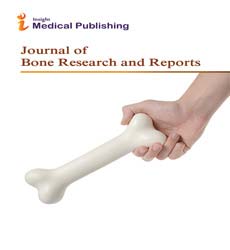Abstract
Early urine proteome changes in an implanted bone cancer rat model
In this study, Walker 256 cells were implanted into rat tibiae. Urine samples were then collected on days 3, 5, 7, and 13 and were analyzed by liquid chromatography-tandem mass spectrometry (LC-MS/MS). With label-free quantification, 25 proteins were found to change significantly in the urine of the tumor group rats compared with the proteins in the urine of the control group rats; this was even the case when there were no significant lesions identified in the Computed Tomography (CT) examination. Among these differentially proteins, 7 were reported to be associated with tumor bone metastasis. GO analysis shows that the differential proteins on day 3 were involved in several responses, including the acute phase response, the adaptive immune response and the innate immune response. The differentially proteins on day 7 were involved in the mineral absorption pathway. The differentially proteins on day 13 were involved in vitamin D binding and calcium ion binding. These processes may be associated with bone metastasis. Our results demonstrate that urine could sensitively reflect the changes in the early stage of implanted bone cancer; this provides valuable clues for future studies of urine biomarkers for tumor bone metastasis.
Biomarkers are the measurable changes associated with a physiological or pathophysiological process. When the body is stimulated by physiological or pathological factors, most of the changes are excreted in the blood for a short period of time because the blood has a strict steady-state regulation. As an excrement, urine can accumulate more changes. Additionally, change is the essence of disease markers. Therefore, many changes in the body can be reflected in the urine. The urine can reflect the changes in multiple organs of the body well, and it is more sensitive to diseases or to physiological changes. Therefore, it is easier to find biomarkers in the urine.
Although urine is an ideal source of biomarkers, the composition of urine is very complex. This is especially true in human urine samples; in addition to the markers produced by the disease, there are many other interfering factors. This makes it difficult to directly use human clinical urine samples to find disease markers. It is not easy to detect markers in the early stages of the disease. Therefore, there is an urgent need to find an easier way to find these markers. We believe that by establishing animal models of disease, biomarkers can be screened; this can remove the influence of other complex factors on the markers and can screen out potential biomarkers at an earlier stage and more easily.
Weight changes with disease As the disease progressed, the body weights of the experimental group rats increased more slowly than those of the control group rats on the seventh day after tumor cell implantation (Fig. 1). On the tenth day, the weight dropped. Both the amount of ingested food and water were significantly reduced. The activity of rats in the experimental group decreased, which may be caused by bone pain.
Changes in the urinary proteins with disease progression (SDS-PAGE) The urinary proteins on Day 3, Day 5, Day 7 and Day 13 of the control group rats and the tumor group rats were analyzed by SDSPAGE gel electrophoresis. It was found that the expression of the urinary protein at 25 kDa increased as the degree of tumor invasion increased. Identification of urinary proteins After LC-MS/MS identification, a total of 900 urinary proteins were identified. Urinary proteins that meet the following criteria can be screened for differential proteins, and in the screening and statistics of differential proteins, we focused on finding the relationship between the differential proteins and the tumor bone metastases, bone-related diseases, and tumors in previous studies.
Keywords: Biomarkers Urine proteome Walker 256 cells Implanted bone cancer rat model
Author(s):
Ting Wanga , Lujun Lia , Weiwei Qina,b , Youhe Gaoa,⁎
Abstract | PDF
Share this

Google scholar citation report
Citations : 235
Journal of Bone Research and Reports received 235 citations as per google scholar report
Abstracted/Indexed in
- Google Scholar
- Directory of Research Journal Indexing (DRJI)
- WorldCat
- Publons
- Geneva Foundation for Medical Education and Research
- Secret Search Engine Labs
Open Access Journals
- Aquaculture & Veterinary Science
- Chemistry & Chemical Sciences
- Clinical Sciences
- Engineering
- General Science
- Genetics & Molecular Biology
- Health Care & Nursing
- Immunology & Microbiology
- Materials Science
- Mathematics & Physics
- Medical Sciences
- Neurology & Psychiatry
- Oncology & Cancer Science
- Pharmaceutical Sciences
